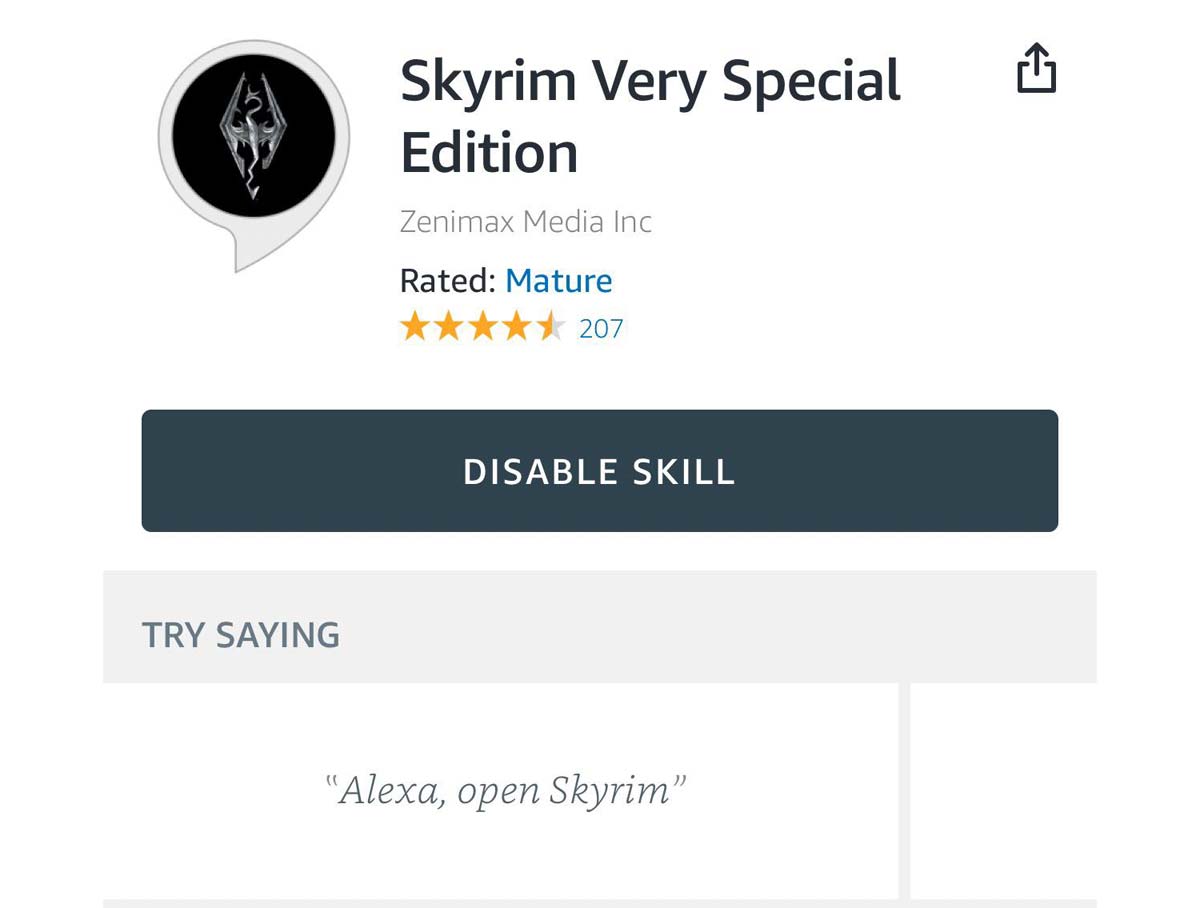Skyrim on Alexa Highlights a Big Problem With Smart Speaker Games
Skyrim has made the jump to Amazon Alexa. It...kind of worked.
If you've been online, you’ve probably played Skyrim. You remember the allure of the vast open world, filled with beasts and monsters, magic and medieval weaponry, and the constant drive to complete quests, level up, and prove your worth. Now imagine all that, but instead of trekking through forests and mountains, you're just yelling at your Amazon Echo in your living room.

Meet Skyrim Very Special Edition, Bethesda Studios' newest Skyrim spinoff that's powered by Amazon Alexa. Unlike its predecessor from the Elder Scrolls series, this game is free to play. There's no installation required; just search "Skyrim" on the Alexa app, enable it on your device, and say "Alexa, open Skyrim."

Alexa’s version of Bethesda's classic RPG is... simplified. The experience is less like navigating a fantastical world, and more like embarking on a "Choose-Your-Own-Adventure" narrated by Alexa's characteristic monotone. You play Dovahkiin, Skyrim's "Chosen One," traipsing around the world in search of glory.
As "Choose-Your-Own-Adventure" skills go, Skyrim's is an interesting idea, but it gets quite repetitive very quickly. You encounter an innkeeper, blacksmith, or other concerned citizen and set off on quests to help them retrieve possessions. The quests consist largely of choosing between destinations (you're always given two choices: a "foggy dock" or a "small hamlet", a treeless plateau" or "windy ridge") and the occasional encounter with enemies.
When fighting enemies (everything from crabs and spiders to elite mercenaries and even dragons), you have four combat options: use your weapon, cast a spell, use a "Shout," and flee. The choice to "flee" is sometimes an illusion. (But aren't all choices, really?). In some battles, if you select it, Alexa will remind you that a brave hero never flees, and prompt you to choose something else. It's cute, but makes you wonder why the option is there.
Eventually, after you've battled enough monsters, you find the valuable item you've been searching for, and embark on another quest. You receive new weapons and loot from some of your foes, and level up after dealing enough damage. While your foes can deal you damage, I've never actually come close to dying.
All in all, the game is monotonous. There's not much strategy involved, and once I realized that selecting combat options at random would always kill my enemies, I very quickly zoned out.
The truth is that this game's bare bones aren't actually different from that of its predecessor: Skyrim is, at its core, a game of finding quests, fighting foes, completing the quests, and repeating the process.
But that process isn't what kept me playing the original Skyrim. I played it because I felt like I was in my character's fights, because I had to strategically interact with characters, duck and dodge my enemies' attacks, and avoid what felt like real danger. My sword conveyed a real sense of force, and I felt the heat of the firebolts I threw.
Skyrim Very Special Edition isn't alone in its format. Many of the most popular one-player games, such as Magic Door, Yes Sire, and Escape the Room take the user on a Choose-Your-Own-Adventure quests where players meander their way through long decision trees of options until they reach their goal. Many of them have very complex and interesting storylines. But no matter how hard I've tried, I've never been able to engross myself in these games the way I can in a good PC or console experience. Alexa's drone, while sometimes charming, isn't enough to keep me engaged.
Bethesda could try integrating some sort of logic puzzle on top of the storyline, or at least make the battles require more strategy. It could make conversations with characters part of some of the quests, and make some characters recur so I learn more about the world around me. It could layer music and audio effects over the narration, or use a livelier narrator than Alexa to give the game a greater sense of urgency. But the countless Alexa games that are trying to keep audiences engrossed in Choose-Your-Own-Adventure narratives need something more than just a story.
Sign up to get the BEST of Tom's Guide direct to your inbox.
Get instant access to breaking news, the hottest reviews, great deals and helpful tips.
Monica Chin is a writer at The Verge, covering computers. Previously, she was a staff writer for Tom's Guide, where she wrote about everything from artificial intelligence to social media and the internet of things to. She had a particular focus on smart home, reviewing multiple devices. In her downtime, you can usually find her at poetry slams, attempting to exercise, or yelling at people on Twitter.
